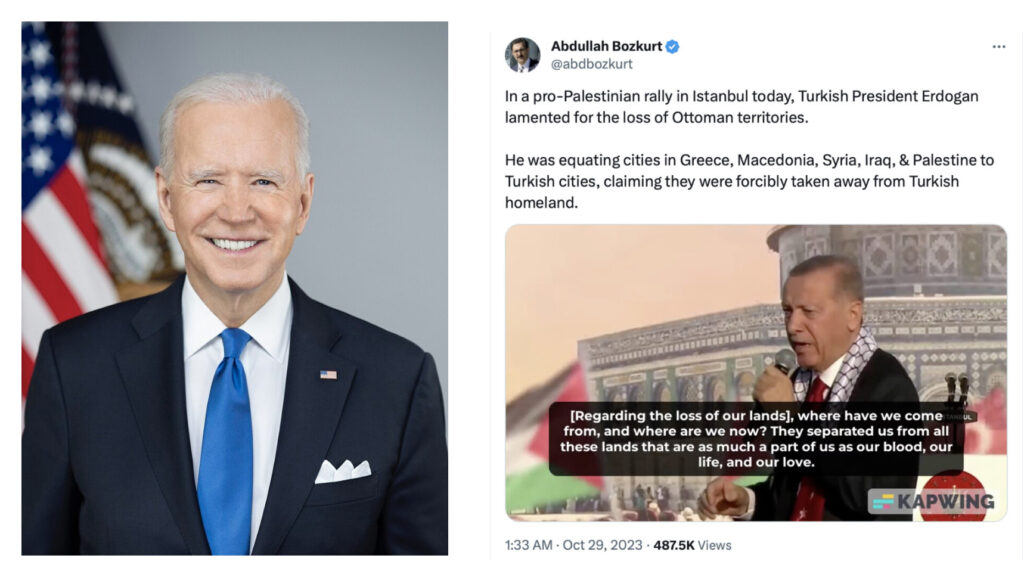
Analysis – Sasha Uzunov, Editor, Alternate Comms
Turkish President Recep Tayyip Erdogan using the Palestine issue as a vehicle for his foreign policy agenda is not surprising. As a political Islamist he wants to be seen as the leader regionally, as in the Balkans-Turkey’s old stomping ground, and the Caucasus-Central Asia, and globally of the Islamist World. But invoking his country’s Ottoman Empire legacy has another political meaning involving competing with the US over control of the Balkans, in particular winning over loyal US client, the Sunni Muslim Albanian political factor.
In a passionate, some would say bellicose, speech in which he threw his support behind Palestinian Arab Muslims in the Israel-Palestine conflict, Erdogan could not resist in mentioning that Turkey too had grievances, as in its former 500 year old empire the Ottoman Empire, which ruled large parts of the Balkans in Europe, North Africa and the Middle East, had been robbed of its territory. The Turkish President also threw in the Crescent versus Cross narrative, meaning Islam versus Christianity, showdown involving the events in the Middle East.
President Erdogan’s understanding of Ottoman history, to put it politely, is missing some basic facts such as the territories that Ottoman once ruled in Greece, Macedonia, Syria, Iraq and so forth were not part of the Turkish homeland but conquered and brutal colonial rule imposed even on fellow Muslims, such as Sunni Arabs, and Orthodox Christian Greeks, Serbs, Bulgars, Macedonians etc. But let’s not get bog down in rehashing history.
President Erdogan is now in a bidding war with US President Joe Biden for the hearts and minds of Albanians in the Balkans. His Ottoman call has negative repercussions for tiny Macedonia as a nation-state and marks a departure from modern Turkey’s long standing secularism which avoided references to its Ottoman past and focused on its founding as a republic by brilliant military commander Kemal Ataturk in 1923 from the ruins of that collapsed Empire.
Since Macedonia’s independence in 1991 from Yugoslavia, Turkey has been a staunch de facto protector. The reason being, the enemy of my enemy is my friend. Greece is both hostile to Turkey and Macedonia. It was a given that Turkey backed the concept of a Macedonian nation-state. With Erdogan’s Ottoman call, in which Macedonia was a colony and Albanians given special privileges, Turkish foreign policy has dramatically shifted.
What it also suggests is that President Erdogan believes that the US could partition Macedonia between an Albanian entity and Bulgaria, perhaps Kosovo between an Albanian entity and Serbia and Bosnia-Hercegovinia. between Muslim Bosnians, Croats and Serbs. By invoking the Ottoman spectre, Turkey is positioning itself as an alternative for Muslim Albanians and Bosnians instead of a US umbrella should massive US inspired border changes take place in the Balkans.
Albania was created in 1912 due to the strategic needs of Austro-Hungarian empire. There was never a strong push for an Albanian state amongst Albanians, many of whom identified as Ottomans or Turks and held privileged positions. They were used as shock troops, known as Bashi-bazouks, to keep majority Macedonians in Ottoman Turkish ruled Macedonia in line.
During WWII, Fascist Italy and Nazi Germany were sponsors of a Greater Albania, which included a large slice of western Macedonia. Post Yugoslavia, the US and UK have supported Albanian nationalist extremists in Macedonia who have been a loyal proxy.
President Erdogan’s pan Islamist or pan Ottomanist call would appeal to a section of Albanians in Macedonia and other countries who do not support secular Albanian nationalism or a simply not satisfied with the US dangling the attractive carrot of a Greater Albania, which would include Albania, Kosovo, large slice of Macedonia and Montenegro but want something more ambitious.
Sizeable numbers joined jihadist groups to fight in Iraq and Syria. Turkey is a member of NATO, the US dominated military alliance and has been a supporter of Israel in the past. Moreover, Turkey has been engaged in a rivalry with Shi’ite Muslim Iran for influence in Central Asia over the Turkic and Persian world in such places as Afghanistan, Tajikistan, Azerbaijan and so forth.
All of this rhetoric from President Erdogan, who despite being hostile to the US is still a US ally, could be designed purely for domestic and international prestige rather than anything substantive. But we don’t know for sure. It could lead to a serious rupture within NATO if Turkey gets involved in the conflict in the Middle East on the Palestinian side against Israel.